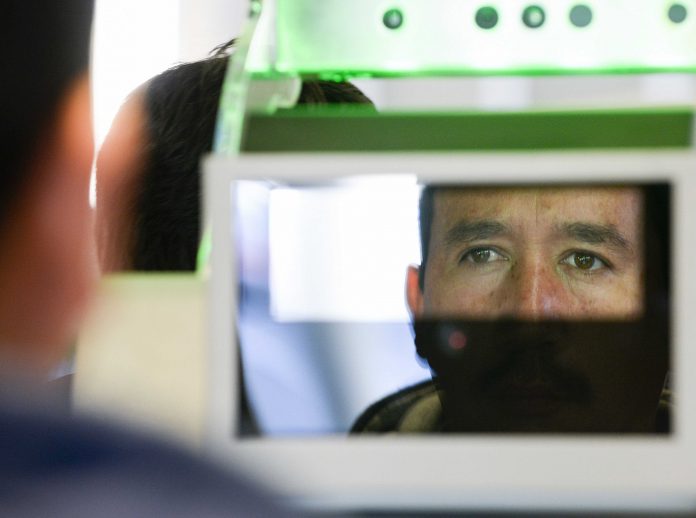The Trump administration announced plans Tuesday to expand the collection of personal “biometric” information by the agency in charge of immigration enforcement, raising concerns about civil liberties and data protection.
In a statement, the Department of Homeland Security said it would soon issue a formal proposal for a new regulation for expanding “the authorities and methods” for collecting biometrics, which are physical characteristics such as fingerprints used to identify individuals.
U.S. Customs and Border Protection, a component of DHS, already collects biometric data, including iris scans, from people captured trying to enter the country without legal authority.
DHS said in a written statement that the new rule would authorize new techniques, including voice and facial recognition to verify people’s identity.
The agency did not release the proposed regulation or provide details. BuzzFeed News, which obtained a draft of the policy, reported earlier Tuesday that it included a provision for U.S. Citizenship and Immigration Services, which is also a component of DHS, to collect biometric data from non-citizens legally working and living in the U.S. or seeking to do so.
It would also require U.S. citizens sponsoring relatives to come to the country to provide biometric data, including in some cases their DNA, if it was needed to verify someone’s identity.
“This is a remarkable expansion of surveillance, especially the idea that immigrants could be called in at any point to give these biometrics,” said Sarah Pierce, an analyst with the Migration Policy Institute.
It typically takes several months for a new regulation to take effect after a public comment period. This measure is likely to prompt legal challenges, as have most immigration measures introduced under President Donald Trump.
Acting Deputy DHS Secretary Ken Cuccinelli characterized the new regulation in a written statement as a way to improve the verification of people’s identities and modernize operations.
“Leveraging readily available technology to verify the identity of an individual we are screening is responsible governing,” Cuccinelli said. “The collection of biometric information also guards against identity theft and thwarts fraudsters who are not who they claim to be.”
DHS is charged with enforcing the strict immigration enforcement policies that have been a hallmark of the Trump administration. But the agency is also in charge Citizenship and Immigration Services, which is responsible for enabling people to legally live and work in the United States.
A lawyer with the Electronic Frontier Foundation, a privacy rights watchdog, said there’s no justification for expanding biometric data collection, and no clear rules for how long the information can be retained, how it can be used, and whether it can be shared with foreign governments or other agencies.
“There doesn’t really seem to be any indication that this will help with combating fraud or anything like that,” said EFF staff attorney Saira Hussain. “Rather, it’s about making it so the government can engage in dragnet surveillance of immigrant communities by being able to access some of their most unique and sensitive biometric information.”
There are also concerns about protecting the data. CBP said last year that photos of travelers and their license plates at a border crossing were compromised in a cyber attack on a government contractor.
“The more data you collect and the more sensitive it is the more that opens up the government to potential data breaches,” Hussain said.
Andrea Flores, deputy director of policy for the American Civil Liberties Union, said the new policy would be an invasion of privacy rights and is a part of a broader administration effort to curtail all immigration.
“They really are trying to shut down legal immigration by creating new barriers, in this case asking people to turn over their most personal information and discouraging people from coming forward and using our legal immigration pathways.” said Flores, a policy analyst at DHS in the Obama administration. “It’s saying that immigrants are suspect and not welcome here, and if you’re related to an immigrant we’re also concerned about your presence.”




















